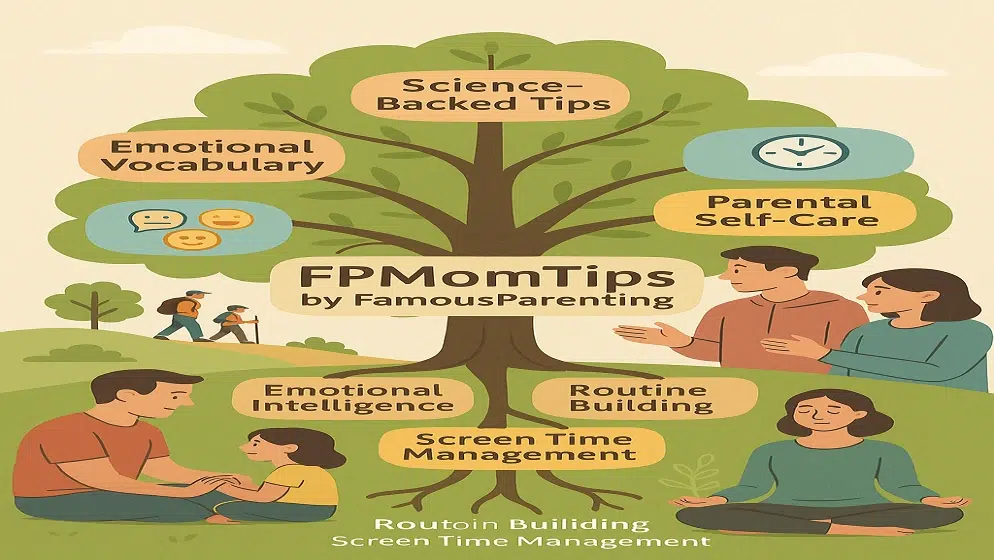Parenthood is a journey that oscillates between heartwarming moments and overwhelming challenges. In an era where information overload often leaves parents more confused than empowered, the FPMomTips Parental Guide by FamousParenting emerges as a trusted compass. This comprehensive resource blends expert-backed strategies with real-life practicality, addressing everything from toddler meltdowns to teenage digital dilemmas. Whether you’re a first-time parent or a seasoned caregiver, this guide equips you with tools to nurture resilient, emotionally balanced children while preserving your own well-being. Let’s explore how FPMomTips redefines modern parenting.
What Makes FPMomTips Unique?
FPMomTips, curated by the acclaimed platform FamousParenting, is not just another parenting manual. It’s a dynamic, evolving toolkit designed for families navigating today’s fast-paced, tech-driven world. Unlike rigid, one-size-fits-all advice, this guide emphasizes adaptability, emotional intelligence, and inclusivity. Here’s a breakdown of its core pillars:
-
Science Meets Practicality: Every tip is rooted in child psychology, neuroscience, and educational research but presented in digestible, actionable steps.
-
Digital-Age Relevance: From screen time to cyberbullying, it tackles modern challenges head-on.
-
Holistic Focus: It prioritizes not just child development but also parental mental health and family bonding.
Read More : www famousparenting com
Deep Dive: Key Components of the FPMomTips Parental Guide
1. Building Routines That Foster Independence and Calm
Chaotic mornings, rushed bedtimes, and homework battles are universal pain points. The FPMomTips guide reframes routines as flexible frameworks rather than strict schedules.
-
Time-Blocking for Busy Families:
The guide introduces “time-blocking”—dividing the day into themed segments (e.g., work, play, learning). For example:-
7–8 AM: “Family Fuel Hour” (breakfast + light exercise).
-
4–5 PM: “Creative Play Zone” (unstructured play without screens).
This method reduces decision fatigue and helps kids anticipate transitions.
-
-
Age-Appropriate Responsibilities:
FPMomTips provides chore charts tailored to developmental stages:-
Ages 3–5: Sorting toys, watering plants.
-
Ages 6–10: Setting the table, packing school bags.
-
Teens: Managing laundry, meal prep.
These tasks build accountability without overwhelming children.
-
-
Mindful Mornings and Bedtimes:
The guide advocates for short, calming rituals:-
*5-minute gratitude circles* at breakfast.
-
Bedtime storytelling with a focus on emotional check-ins (“What made you happy today?”).
-
2. Cultivating Emotional Intelligence (EQ) in Children
EQ is a predictor of long-term success, and FPMomTips offers science-backed strategies to nurture it:
-
Emotional Vocabulary Building:
Teach kids to label emotions using tools like “feeling wheels” or emoji cards. For instance, instead of saying, “I’m mad,” a child learns to articulate, “I’m frustrated because my tower fell.” -
Conflict Resolution Frameworks:
Sibling fights? The guide suggests the “3Cs Method”:-
Calm Down: Take deep breaths together.
-
Communicate: Use “I feel” statements (no blaming).
-
Collaborate: Brainstorm solutions as a team.
-
-
Empathy in Action:
Activities like volunteering at a food bank or writing thank-you notes to community helpers (e.g., firefighters) help kids connect emotions to real-world impact.
3. Navigating Screen Time with Intention
Instead of demonizing technology, FPMomTips teaches families to harness its benefits mindfully:
-
Family Media Agreements:
Collaborate on rules, such as:-
Tech-Free Zones: No devices at dinner tables or bedrooms.
-
Content Curfews: No violent games or social media after 8 PM.
-
Shared Screen Time: Watch educational shows together and discuss them.
-
-
Educational Tech Tools:
The guide recommends apps that align with learning goals:-
Khan Academy Kids (math/science for ages 2–8).
-
Duolingo (language learning for teens).
-
Headspace for Kids (mindfulness exercises).
-
-
Digital Literacy Conversations:
Prepare older kids for online risks:-
Discuss cyberbullying and how to report it.
-
Teach critical thinking about social media (e.g., “Is this post realistic?”).
-
4. Prioritizing Parental Well-Being
FPMomTips boldly challenges the “self-sacrificing parent” myth. Its self-care strategies are realistic for time-crunched adults:
-
Micro Self-Care Rituals:
-
*90-second breathing exercises* during a child’s nap.
-
Gratitude journaling (3 things you’re proud of daily).
-
Walking meetings (take work calls while strolling outdoors).
-
-
Building a Support System:
The guide encourages joining FamousParenting’s online forums or local parent groups. Tips include:-
Swap babysitting hours with a trusted neighbor.
-
Delegate tasks (e.g., ask grandparents to handle school pickups once a week).
-
-
Letting Go of Guilt:
A standout chapter, “Good Enough Parenting,” reassures caregivers that perfection is unattainable—and unnecessary.
Why Parents Love FPMomTips
-
Evidence-Based Yet Relatable:
The guide cites studies (e.g., Harvard’s Center on the Developing Child) but pairs them with anecdotes from real parents. For example, one mother shares how using the “5-4-3-2-1” grounding technique helped her toddler manage tantrums. -
Inclusivity for All Families:
Strategies are adaptable for:-
Single-parent households.
-
Blended families.
-
Neurodivergent children (e.g., sensory-friendly routines for ADHD).
-
-
Interactive Tools:
Downloadable templates include:-
Weekly meal planners with kid-friendly recipes.
-
Screen time trackers to monitor usage.
-
Emotional check-in charts for daily mood tracking.
-
Read More : famparentlife entrepreneurial parent infoguide from famousparenting
Addressing Modern Parenting Dilemmas: Case Studies
Case 1: The Over-Scheduled Family
A dual-career couple with three kids (ages 4, 7, and 12) struggled with burnout.* Using FPMomTips’ time-blocking method, they:
-
Cut extracurriculars from 6 to 3 per week.
-
Instituted “Screen-Free Sundays” for hiking and board games.
-
Result: Kids reported feeling “less rushed,” and parents reclaimed downtime.
Case 2: Teen Social Media Stress
A 14-year-old faced anxiety from Instagram comparisons.* Guided by the FPMomTips digital wellness chapter, the family:
-
Created a “no phones after 9 PM” rule.
-
Enrolled in a social media literacy workshop.
-
Result: The teen began using apps like Calm and limited scrolling to 1 hour daily.
Final Thoughts: Parenting with Purpose
The FPMomTips Parental Guide by FamousParenting isn’t about achieving perfection—it’s about progress. By merging cutting-edge research with compassionate, real-world advice, it empowers parents to raise emotionally intelligent, digitally savvy, and resilient children. In a world where parenting trends come and go, FPMomTips stands out as a timeless resource that grows with your family.
Whether you’re battling bedtime chaos or decoding teen slang, this guide offers a judgment-free space to learn, adapt, and thrive. After all, the goal isn’t to be a “perfect” parent—it’s to raise happy, healthy kids while staying true to yourself.
Read More : fpmomlife parenting guideline from famousparenting
3 FAQs About FPMomTips
1. Is this guide suitable for parents of children with special needs?
Yes! FPMomTips includes modules on sensory-friendly routines, communication tools for non-verbal kids, and collaborating with therapists. FamousParenting also partners with pediatric experts to ensure inclusivity.
2. How do I access the FPMomTips guide?
It’s available in three formats:
-
Digital eBook: Instant download from FamousParenting’s website.
-
Print Edition: Includes workbook-style worksheets.
-
Audio Version: For busy parents to listen on-the-go.
3. Can these strategies work for defiant toddlers or rebellious teens?
Absolutely. The guide’s discipline section emphasizes connection over correction. For example, instead of time-outs, it recommends “time-ins” (staying with the child to process emotions). For teens, collaborative problem-solving (“Let’s find a solution together”) builds trust.+
Read Also – giveaway lookwhatmomfound , giveaways look what mom found



